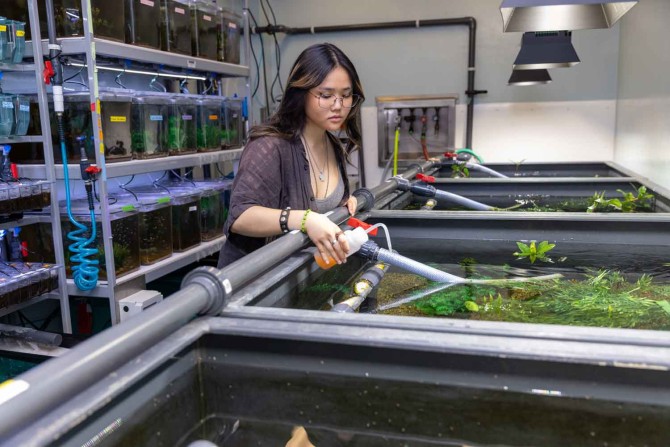News directly from Cornell's colleges and centers
Undergrads relish challenging Nexus Scholar research projects
By Kathy Hovis
This summer Blythe Wong ’25 has been “fishing for answers” to understand how genes and hormones shape the way organisms look and behave, working with thousands of tiny Poecilia parae fish swimming in the aquariums of Ben Sandkam’s lab in Mudd Hall. Sandkam in an assistant professor in the Department of Neurobiology and Behavior in the College of Arts & Sciences.
Wong has not only been interacting directly with the fish — breeding and feeding them — but has also been working at the molecular level to extract RNA, separate DNA and develop new assays for gene expression.
“As someone who's into marine biology, being able to work with fish is very exciting,” said Wong, who’s majoring in biology with a concentration in microbiology and interests in genetics. “This position is perfect for me because it combines the test organism that I'm the most interested in with the type of research I want to do.”
Wong is one of 101 Nexus Scholars who spent eight weeks this summer working with researchers on campus on projects in the humanities, social sciences and physical sciences. From compiling oral histories of Asian-American Cornellians to using artificial intelligence to find patterns in New York Times obituaries to studying genetic diversity in fish, student research this summer was broad and deep.
The Nexus Scholar Program, in its second summer, offers students the chance to work with a Cornell research lab, join in weekly career development and networking sessions and form a cohort of other students interested in research. Scholars presented their research at a July 26 event to celebrate the end of their summer projects, though many plan to continue with their labs during the fall semester.
"The Nexus Scholars program provides meaningful opportunities for undergraduate students, and faculty and their research groups. It is amazing to watch students start the summer a bit unsure about research and end it by confidently explaining and owning their projects, and describing how the skills they learned will be useful for their future careers," said Michelle Smith, senior associate dean for undergraduate education and the Ann S. Bowers Professor of Ecology and Evolutionary Biology. "A&S is enormously proud of the students and so grateful to the research mentors for providing these opportunities."
Read the full story about Nexus Scholar summer projects on the College of Arts & Sciences website.
Media Contact
Get Cornell news delivered right to your inbox.
Subscribe

